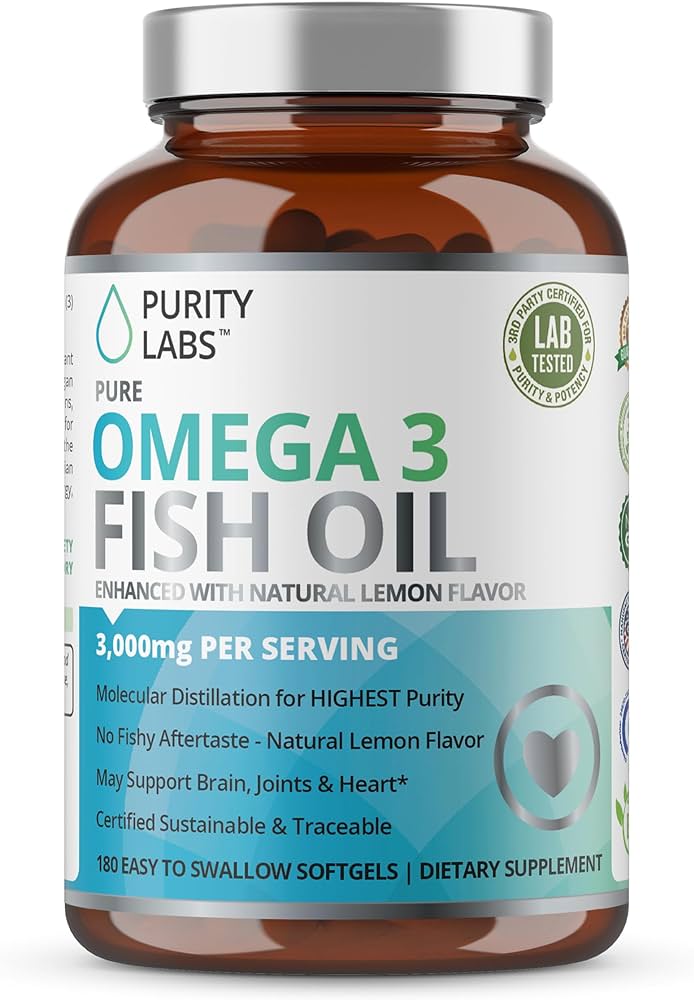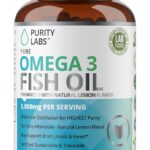Physical Address
304 North Cardinal St.
Dorchester Center, MA 02124


If you’re looking to improve your overall health and well-being, adding Omega-3 supplements to your daily routine could be a game-changer. Omega-3 supplements are known for their numerous health benefits, including promoting heart health, reducing inflammation, and supporting brain function. In this blog post, we will delve into the fundamental importance of Omega-3s, the benefits of Omega-3 supplements for optimal health, and why you should consider incorporating them into your daily routine.
Omega-3 fatty acids are categorized as essential fats, meaning our bodies are incapable of synthesizing them independently. This necessitates their acquisition through dietary sources or supplementation. The significance of Omega-3s extends far and wide within our bodily systems, underpinning numerous physiological functions critical to maintaining health and preventing disease.
These fatty acids are primarily found in fish, particularly fatty species like salmon, mackerel, and sardines, as well as in flaxseeds, chia seeds, and walnuts, among other foods. However, due to dietary preferences, restrictions, or the challenge of consuming adequate amounts through food alone, Omega-3 supplements serve as a vital alternative to ensure sufficient intake.
The anti-inflammatory capabilities of Omega-3s are perhaps one of their most notable attributes. Chronic inflammation is a root cause of myriad health issues, ranging from cardiovascular diseases to metabolic disorders and beyond. By mitigating inflammation, Omega-3s aid in the reduction of associated risks and promote a healthier inflammatory response within the body.
Furthermore, these fatty acids are foundational to the structure of cell membranes, especially in the brain, emphasizing their role in cognitive health. The fluidity of cell membranes influences the function of receptors and, consequently, the efficient transmission of signals within the brain. This mechanism underscores the importance of Omega-3s in cognitive processes, including learning and memory.
The role of Omega-3s extends into the realm of mental health, with evidence suggesting their involvement in neurotransmitter function, including serotonin and dopamine regulation. These neurotransmitters are crucial for mood stabilization, and imbalances are often linked with depression and anxiety disorders. Therefore, adequate Omega-3 intake can be instrumental in supporting mental well-being.
Pregnancy and early childhood development also highlight critical periods where Omega-3s are particularly vital. DHA, one of the key Omega-3 fatty acids, is essential for the development of the brain and retina, implicating Omega-3s in the healthy growth and development of infants.
Omega-3s also play a role in maintaining skin health by contributing to the lipid content of the skin barrier, which helps to keep the skin hydrated and protects against external irritants and pollutants. Furthermore, their anti-inflammatory properties can benefit conditions such as eczema and psoriasis, which are characterized by chronic inflammation of the skin.
It is clear that Omega-3 fatty acids hold a paramount position in the maintenance of health and the prevention of disease. Their influence spans across cardiovascular, cognitive, mental, and overall physical health, solidifying the necessity of these essential fats in our daily intake. For individuals unable to meet their Omega-3 needs through diet alone, supplements offer a convenient and effective means to fill this nutritional gap, underscoring the indispensable role Omega-3 supplementation can play in supporting a multitude of health outcomes.
The profound health advantages of incorporating Omega-3 supplements into a daily health regimen span far beyond the commonly known heart health support. These supplements, rich in EPA and DHA, extend their benefits to a myriad of bodily functions and disease prevention mechanisms, making them an essential addition for those seeking to optimize their health.
In the realm of cardiovascular wellness, Omega-3 supplements play a pivotal role. Beyond merely lowering triglyceride levels, these fatty acids aid in regulating cholesterol levels by increasing HDL (good) cholesterol. This balance is crucial for maintaining healthy blood vessels and preventing atherosclerosis. Additionally, Omega-3s have been associated with a decreased risk of stroke and heart failure, further underscoring their significance in cardiovascular health.
The anti-inflammatory properties of Omega-3 supplements are a cornerstone of their health benefits. Chronic inflammation is a silent adversary, contributing to the development of several diseases and conditions. By reducing the body’s inflammatory response, Omega-3s can alleviate symptoms associated with autoimmune diseases, such as rheumatoid arthritis, and conditions like inflammatory bowel disease, offering a more comfortable daily life for those affected.
Brain health and cognitive function significantly benefit from Omega-3 supplementation. These fatty acids are essential components of brain cell membranes, contributing to the maintenance of neuronal function and flexibility. This is particularly important as we age, with studies indicating a correlation between Omega-3 intake and a reduced risk of cognitive decline, dementia, and Alzheimer’s disease. For younger populations, Omega-3s support cognitive development, learning, and memory, highlighting their importance across all life stages.
Mental health improvements are another noteworthy benefit of Omega-3 supplements. The modern understanding of mental health recognizes the complex interplay between nutrition and psychological well-being. Omega-3 fatty acids, particularly EPA, have been linked to improved mood regulation and a reduction in symptoms of depression and anxiety. This connection offers a promising adjunct treatment option for those managing mental health conditions, providing a natural avenue to support traditional therapies.
Visual health also gains from the regular intake of Omega-3 supplements. DHA is a major structural component of the retina, and adequate levels of this fatty acid are essential for maintaining eye health and function. Research suggests that Omega-3s may help prevent age-related macular degeneration, one of the leading causes of vision impairment and blindness in older adults, showcasing yet another dimension of their protective effects.
Furthermore, the benefits of Omega-3 supplements extend to maternal and infant health. Adequate Omega-3 intake during pregnancy is linked to numerous developmental benefits for the baby, including better brain and eye development and a lower risk of allergies. These findings emphasize the role of Omega-3s in early life stages, underlining the importance of maternal supplementation for long-term child health outcomes.
The encompassing benefits of Omega-3 supplements for optimal health are undeniable. From supporting heart health and reducing inflammation to enhancing brain function, mental health, and beyond, Omega-3s stand out as a powerful tool in the pursuit of comprehensive well-being. Their role in disease prevention and health optimization cannot be overstated, presenting a compelling case for their inclusion in the daily health regimen of individuals aiming to lead a healthy and vibrant life.
Incorporating Omega-3 supplements into your lifestyle offers a straightforward path toward enhancing your well-being, catering to a variety of health objectives from bolstering cardiovascular health to nurturing mental wellness. The modern diet often falls short in providing adequate amounts of these essential fats, making supplementation a practical choice for many.
The decision to integrate Omega-3 supplements into your health regimen comes with the assurance of supporting and maintaining the intricate systems of your body. It is an investment in your future self, with potential dividends paid in the form of reduced health risks and improved quality of life. While our discussions have highlighted the broad spectrum of benefits offered by Omega-3s, it’s equally important to consider the personal health goals and nutritional gaps that these supplements can help address.
Choosing the right Omega-3 supplement is critical to maximizing these health benefits. It involves selecting products that are transparent about their EPA and DHA content, ensuring that you receive the most impactful dose of these essential nutrients. Opt for products that undergo third-party testing for purity and potency to avoid contaminants like heavy metals, which can detract from the health benefits you seek.
Additionally, understanding the source of Omega-3 in your chosen supplement is key. While fish oil is a popular and effective source, vegetarians and vegans can opt for algae-based supplements, which provide a plant-based source of DHA and EPA. This inclusivity ensures that everyone, regardless of dietary preferences, can benefit from Omega-3 supplementation.
Compliance with your Omega-3 supplementation is also essential for reaping its full benefits. Consistency in taking your supplement as directed, combined with a balanced diet and healthy lifestyle, amplifies its effectiveness in supporting your health objectives. Remember, supplements are most beneficial when used to complement a healthy diet and not as a sole source of nutrients.
It’s worth consulting with a healthcare professional to tailor your Omega-3 supplementation according to your specific health needs and conditions. This personalized approach ensures that your supplementation strategy aligns with your overall health plan, including any medications or conditions that may interact with Omega-3 supplements.
In essence, Omega-3 supplements represent a key component of a proactive approach to health maintenance. Their broad-reaching benefits, from supporting heart and brain health to contributing to a healthier inflammatory response, position Omega-3 supplements as a valuable ally in your quest for long-term well-being. Embracing Omega-3 supplementation is not just about addressing nutritional deficiencies; it’s about making a conscious choice to invest in your health at every stage of life.









